Paul Puccinelli shares his reflection for the Fourth Sunday of Advent.
Daily Scripture, December 22, 2024
Fourth Sunday of Advent
Scripture:
Micah 5:1-4a
Hebrews 10:5-10
Luke 1:39-45
Reflection:
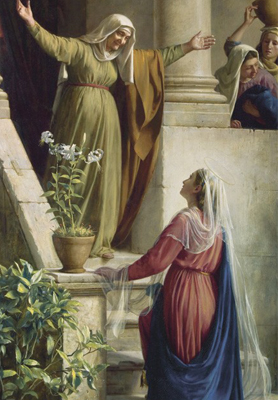
During this Advent season, we have been reflecting on yearning for the coming of Jesus, opening our hearts to Him, and opening our hearts to each other. In our Gospel reading for this Sunday (Luke 1:39-45), we see the connection between hope and love in the interaction between Mary and Elizabeth.
Our Gospel reading begins just after the angel Gabriel announces to Mary that she is to be the mother of the Messiah, and that her relative Elizabeth, considered too old and barren to conceive, is pregnant. After hearing all this and accepting God’s will, Luke tells us that Mary went “in haste” to see Elizabeth. We can imagine all the things running through Mary’s mind: to see how Elizabeth was doing, and to tell her what just happened with herself.
We can imagine the joy of the moment of their meeting! Both these women were going to bring new life into the world. They not only saw what this meant for themselves and for Zechariah and Joseph, but also for God’s plan of salvation.
There is a very old saying: “Where there’s life, there’s hope.” Mary and Elizabeth demonstrate this so well! And they demonstrate that where there’s hope, there’s love.
When there is hope, life is considered worth living. As I thought about Mary and Elizabeth giving birth to Jesus and John, I thought about babies still being born in Gaza and Israel and Ukraine and South Sudan and many other places where to have hope may be considered to be foolish.
Is it foolish to hope for justice and peace? Is it foolish to love as Jesus loves? It may be foolish in the eyes of the world, but if we have the faith of all the prophets and the people we have been hearing about during these weeks of Advent: Mary and Joseph and Elizabeth and John the Baptist; if we have the faith to trust in God’s love and God’s plan; if we have made room for Jesus in our hearts, we can still live in hope and in love, working for justice and peace.
And perhaps one step we can take is to consider what Elizabeth says to Mary into our own relationships with others and with the whole world. Elizabeth says to Mary: “And how does this happen to me, that the mother of my Lord should come to me?” What if every encounter we have with another person was accompanied with the thought: “How does this happen to me, that the beloved of my Lord should come to me?”
To paraphrase what Elizabeth also says to Mary: Blessed are we who believe that what has been spoken to us by the Lord will be fulfilled. Blessed are we who live in hope and dare to love.
Fr. Phil Paxton, C.P., is the local superior of the Passionist Community in Birmingham, Alabama.
My Sacred Space: Rob Carbonneau, CP
My sacred space is America's local food diner.
It is sacred for me because Advent invites us on a journey to renew our faith in Jesus. Family tradition leads many of us to travel American highways. Oftentimes, we seek to refuel our cars and eat our favorite comfort food at a local food diner. Whether near or far away from home, eating at any American diner can remind us we are waiting for Jesus at Christmas. Sitting among friends or strangers can be a moment when Catholics, Christians and peoples of the world are invited to renew their resolve for personal and world peace. Let us consider how any American diner is sacred space during our common Advent journey.
~ Rob Carbonneau, CP
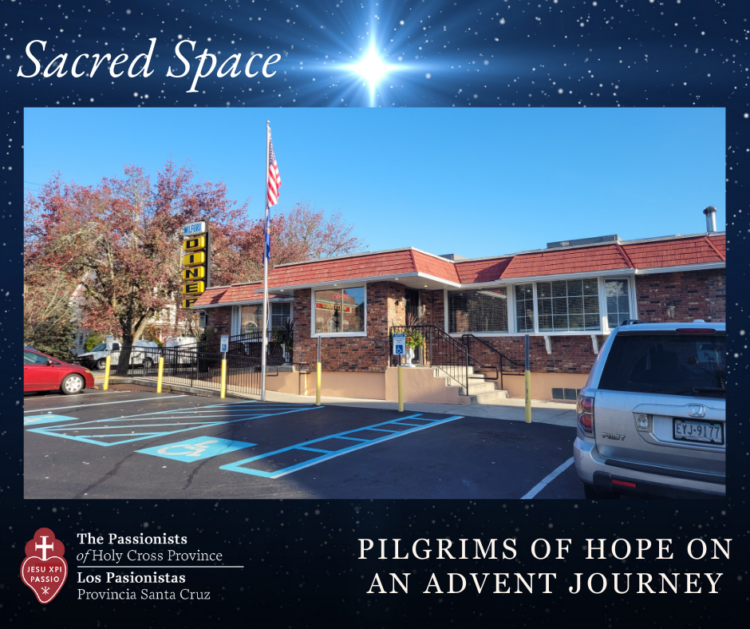
Daily Scripture, December 21, 2024
Scripture:
Song of Songs 2:8-14 or Zephaniah 3:14-18
Luke 1:39-45
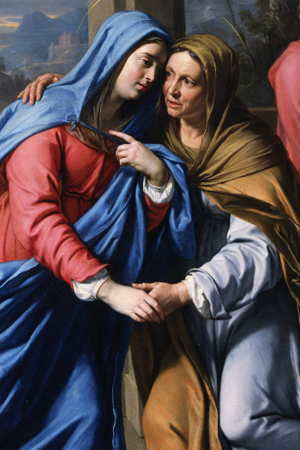
Reflection:
Our first reading comes from the Song of Songs which has often been seen as an allegory of God’s love for his people. In this passage the groom represents God and we see God inviting the beloved to come and live with God in happiness. In the alternate reading from the Prophet Zephaniah, the people are told to rejoice for the Lord is in their midst. God has protected them from their enemies. In the gospel text, we see Mary traveling to visit Elizabeth and her unborn son rejoicing for Mary is carrying the Lord and therefore is blessed. (Adapted from Reflections on the Daily Readings; The Irish Province of the Order of Carmelites (O.Carm.) http://www.carmelites.ie/prayer.html)
There are just a few more days till Christmas. These texts remind us that God is renewing us with affirming love. Have you ever thought that God is glad because of you and me? This fills me with Advent hope. The first two texts are about living our life in union with God and about our being restored in God’s life and love. “God sings joyfully because of you” (Zephaniah 3: 18). Can we imagine that God is singing joyfully because of us? Like Jerusalem, we too have fallen short of our best self at times. Our God yearns to be one with us. God is the Great Restorer. In these final days of Advent let us take some time to be mindful and joyful as we prepare for Christmas. (Adapted from Sr. Macrina Wiederkehr, O.S.B., Living Faith, October, November, December 2019, Saturday, December 21, 2019)
Carl Middleton is a theologian/ethicist and a member of the Passionist Family.
My Sacred Space: Emily Shaffer
The Sleeping Bear Sand Dunes in Northern Michigan are one of my sacred spaces - a spot where I feel close to God. Standing high on the dunes, I can hear the soft sound of Lake Michigan’s waves in the distance, and it brings a calm and quiet that settles my anxious mind. I feel surrounded by the beauty of God’s creation. In this peaceful space, with the steady rhythm of the waves, I feel a sense of peace and connection that renews my spirit and helps me feel grounded.
~ Emily Shaffer
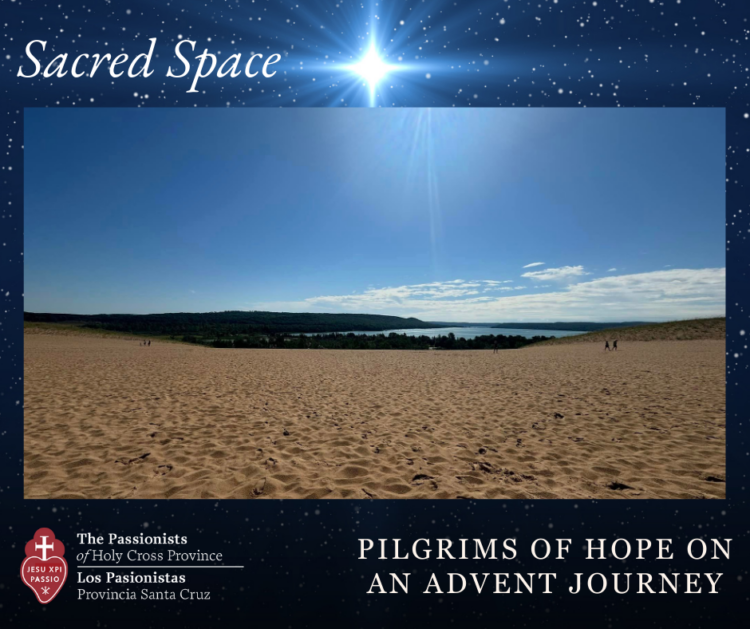
Daily Scripture, December 20, 2024
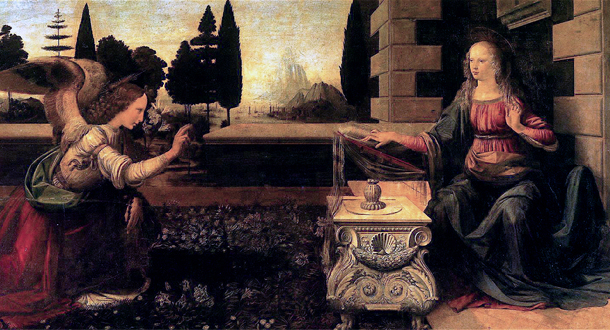
Scripture:
Reflection:
In five days, we will celebrate the feast of Christmas. Hovering over the Scripture readings for today is the question, “How prepared are you?” This question is not raised in some kind of judgmental way, implying that you’re not prepared. Rather, it is raised as an invitation to open your heart even more to the saving coming of the Son of God.
In the first reading from Isaiah, we hear again the prophecy that God will save his people. The sign that the fulfillment of this prophecy is at hand will be a virgin who conceives and bears a son and names him Emmanuel.
In the Gospel we recall that astounding moment. The Angel Gabriel invites Mary, a virgin, to be the Mother of the Son of God, and she accepts. The promise and the fulfillment. God is faithful. Are we ready?
The story of the Annunciation illustrates for us the attitude of heart we need to be fully prepared. Mary is puzzled by the words of the Angel for she can’t imagine how these things could come about. Though puzzled and questioning, she nonetheless accepts whatever God is asking of her. In her heart she so totally trusts in God that she is able to say an unequivocal “yes” to whatever God wants. And, at the moment of her “yes” the Son of God is conceived within her!
So emerges the question for us, “How prepared are we?” Are we ready to open our hearts to accept whatever God is asking of us? Can we move beyond our fears and insecurities to unequivocally trust in God’s will for us? The prayer that emerges from these readings and the feast of Christmas could well be, “Come, Lord Jesus into my heart. Help me to trust in you and your loving presence in my life.”
Fr. Michael Higgins, C.P. is a member of the Passionist Community at Mater Dolorosa, Sierra Madre, California.
My Sacred Space: Wade White
The golf course is sacred for me because when I’m on the golf course, I experience nature in many different ways. I’m at peace and can really appreciate the power and presence of God.
~ Wade White
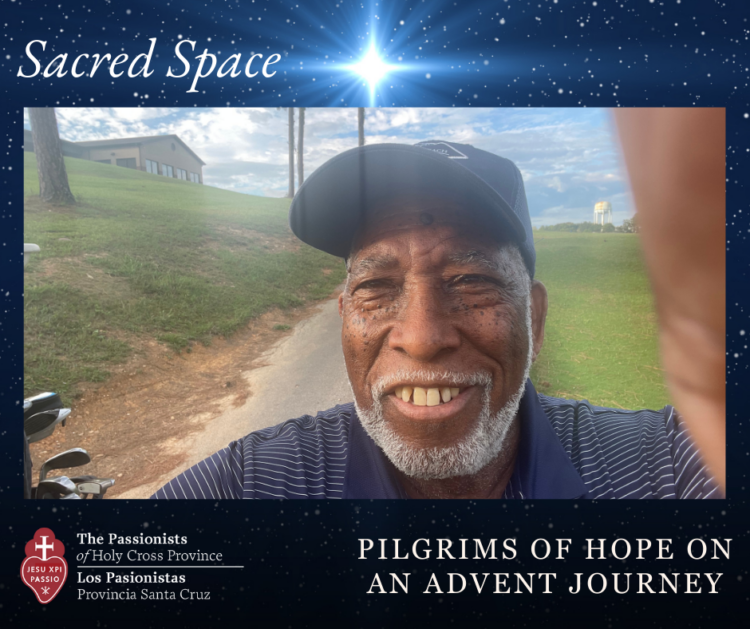
Daily Scripture, December 19, 2024

Scripture:
Judges 13:2-7, 24-25a
Luke 1:5-25
Reflection:
Do Not Be Afraid
Lately, the phrase “Do not be afraid” has seemed to appear everywhere. I can’t help but reflect on its significance, especially during this time of Advent as we prepare for the birth of the Christ child.
Imagine what it must have been like for Mary and Joseph, traveling to Bethlehem with baby Jesus in her womb. What fears and worries filled their hearts or had they journeyed this way before and were assured of God’s providential care. Scripture often reminds us of God’s reassuring words: “Do not be afraid.” Whenever God speaks or an angel appears, this message is repeated—offering assurance that He has heard our prayers and will answer them in His time. It is a reminder to trust Him and to know that we are never alone.
Pope John Paul II echoed these words throughout his pontificate. In a world full of fear, doubt, and lies, he encouraged us to stand firm in faith. The world says to a young, pregnant girl, “You are alone,” or to a couple, “Live together first to avoid divorce. The world often tells us that we’re not up to some standard of attractiveness or intelligence. These lies create anxiety and confusion, leaving many feeling isolated and lost.
Yet in the face of this, we must remember the words of John Paul II: “Do not be satisfied with mediocrity. Do not be afraid to be holy.” God’s truth is our comfort and strength. Like Zechariah, who was struck mute until God’s promise was fulfilled, or like St. Gemma, who was reassured by St. Gabriel to “not be afraid” she would become a Passionist!
As crazy as it sounds, we often doubt God’s ability when He calls us. Yet, over and over we hear how God works through our brokenness. We too are called to trust and not be afraid. So as we continue to prepare ourselves for the birth of Christ may our hearts be open to receive God’s will for our lives trusting His plan is better than ours.
Lori Kananen, LMC, is a lay Pastoral Associate at Holy Name Passionist Retreat Center in Houston, Texas.
